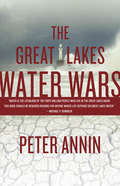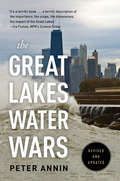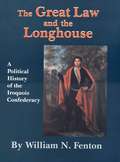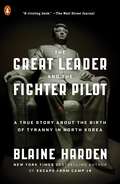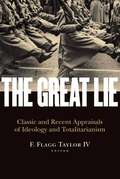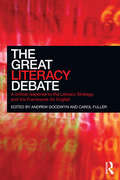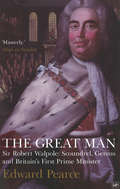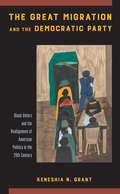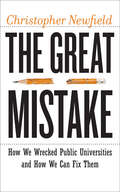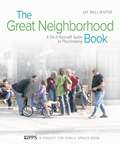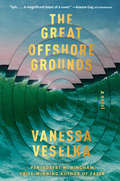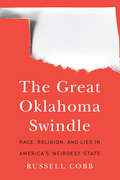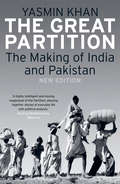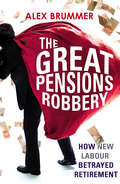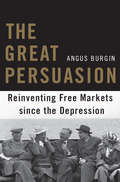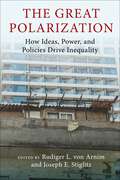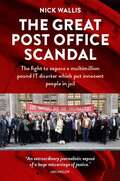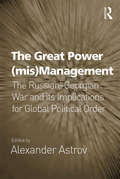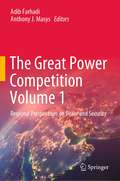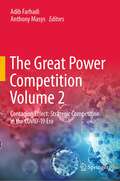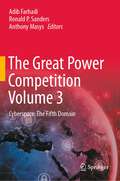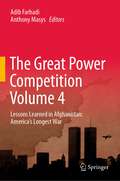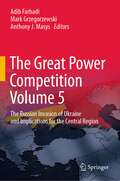- Table View
- List View
The Great Lakes Water Wars
by Peter AnninThe Great Lakes are the largest collection of fresh surface water on earth, and more than 40 million Americans and Canadians live in their basin. Will we divert water from the Great Lakes, causing them to end up like Central Asia's Aral Sea, which has lost 90 percent of its surface area and 75 percent of its volume since 1960? Or will we come to see that unregulated water withdrawals are ultimately catastrophic? Peter Annin writes a fast-paced account of the people and stories behind these upcoming battles. Destined to be the definitive story for the general public as well as policymakers, The Great Lakes Water Wars is a balanced, comprehensive look behind the scenes at the conflicts and compromises that are the past-and future-of this unique resource.
The Great Lakes Water Wars
by Peter AnninFor over a century the Great Lakes have been the target of controversial diversion schemes to sell, send, or ship water to thirsty communities, sometimes far from the source. In 2008, eight US states signed the historic Great Lakes Compact designed to protect the region's precious freshwater resources. Now water diversion controversies of a different kind are pitting communities and states against one another. Will the water wars ever be settled?With three new chapters and significant revisions that bring the story up to date over the past decade, this is the definitive behind-the-scenes account of the people and stories behind hard-fought battles to protect this precious resource that makes the region so special for the millions who call it home.
The Great Law and the Longhouse: A Political History of the Iroquois Confederacy (The Civilization of the American Indian Series)
by William Fenton<p>An in-depth survey of Iroquois culture and history <p>This masterful summary represents a major synthesis of the history and culture of the Six Nations from the mid-sixteenth century to the Canandaigua treaty of 1794. William N. Fenton, renowned as the dean of Iroquoian studies, draws on primary sources, in both French and English to create a readable narrative and an invaluable reference for all future scholars of Iroquois polity. <p>Central to Fenton’s study is the tradition of the Great Law, still practiced today by the conservative Iroquois. It is sustained by celebrations of the condolence ceremony when participants mourn a dead chief and install his successor for life on good behavior. This ritual act, reaching back to the dawn of history, maintained the League of the Iroquois, the legendary form of government that gave way over time to the Iroquois Confederacy.</p>
The Great Leader and the Fighter Pilot
by Blaine HardenFrom the New York Times bestselling author of Escape From Camp 14, Blaine Harden tells the riveting story of Kim Il Sung's rise to power, and the brave North Korean fighter pilot who escaped the prison state and delivered the first MiG-15 into American handsIn The Great Leader and the Fighter Pilot, New York Times bestselling author Blaine Harden tells the riveting story of how Kim Il Sung grabbed power and plunged his country into war against the United States while the youngest fighter pilot in his air force was playing a high-risk game of deception--and escape.As Kim ascended from Soviet puppet to godlike ruler, No Kum Sok noisily pretended to love his Great Leader. That is, until he swiped a Soviet MiG-15 and delivered it to the Americans, not knowing they were offering a $100,000 bounty for the warplane (the equivalent of nearly one milliondollars today). The theft--just weeks after the Korean War ended in July 1953--electrified the world and incited Kim's bloody vengeance.During the Korean War the United States brutally carpet bombed the North, killing hundreds of thousands of civilians and giving the Kim dynasty, as Harden reveals, the fact-based narrative it would use to this day to sell paranoia and hatred of Americans.Drawing on documents from Chinese and Russian archives about the role of Mao and Stalin in Kim's shadowy rise, as well as from neverbefore- released U.S. intelligence and interrogation files, Harden gives us a heart-pounding escape adventure and an entirely new way to understand the world's longest-lasting totalitarian state.From the Hardcover edition.
The Great Leader and the Fighter Pilot: The True Story of the Tyrant Who Created North Korea and the Young Lieutenant Who Stole His Way to Freedom
by Blaine HardenFrom the New York Times bestselling author of Escape From Camp 14, Blaine Harden tells the riveting story of Kim Il Sung's rise to power, and the brave North Korean fighter pilot who escaped the prison state and delivered the first MiG-15 into American handsIn The Great Leader and the Fighter Pilot, New York Times bestselling author Blaine Harden tells the riveting story of how Kim Il Sung grabbed power and plunged his country into war against the United States while the youngest fighter pilot in his air force was playing a high-risk game of deception--and escape.As Kim ascended from Soviet puppet to godlike ruler, No Kum Sok noisily pretended to love his Great Leader. That is, until he swiped a Soviet MiG-15 and delivered it to the Americans, not knowing they were offering a $100,000 bounty for the warplane (the equivalent of nearly one million dollars today). The theft--just weeks after the Korean War ended in July 1953--electrified the world and incited Kim's bloody vengeance.During the Korean War the United States brutally carpet bombed the North, killing hundreds of thousands of civilians and giving the Kim dynasty, as Harden reveals, the fact-based narrative it would use to this day to sell paranoia and hatred of Americans.Drawing on documents from Chinese and Russian archives about the role of Mao and Stalin in Kim's shadowy rise, as well as from never-before-released U.S. intelligence and interrogation files, Harden gives us a heart-pounding escape adventure and an entirely new way to understand the world's longest-lasting totalitarian state.From the Hardcover edition.
The Great Lie: Classic and Recent Appraisals of Ideology and Totalitarianism
by IV F. Flagg TaylorThe Most Insightful and Profound Reflections on Tyranny. Totalitarianism was the dominant phenomenon of the twentieth century. Deeply troubling questions endure regarding the nature of such tyrannical regimes: What enabled human beings to carry out such horrific crimes against their fellow man? What does the endurance of Communism reveal about human liberty? Why did human beings suffer rule by ideological lies for so long, and what kept them open to the truth? What are we to make of the relationship between totalitarianism and the foundational principles of democratic modernity? Some of the greatest minds of the twentieth century sought answers to these haunting questions. Now, for the first time ever, their incisive and profound reflections on totalitarianism have been brought together in one book. The Great Lie showcases the insights of such giants as Aleksandr Solzhenitsyn, Vaclav Havel, Hannah Arendt, Eric Voegelin, Czeslaw Milosz, Leo Strauss, and Raymond Aron, along with neglected but important thinkers such as Waldemar Gurian, Aurel Kolnai, Leszek Kolakowski, Pierre Manent, Claude Lefort, and Chantal Delsol. The brilliant essays in this volume illuminate the very nature of totalitarian regimes, and the monstrous ideology that is their defining feature. The Great Lie allows readers to make sense of political evil and how it can attract so many people into its ideological fold. This is not a matter of mere academic interest in an age when we confront totalitarianism in such regimes as North Korea and Cuba—and, arguably, in radical Islamist movements.
The Great Literacy Debate: A Critical Response to the Literacy Strategy and the Framework for English
by Andrew Goodwyn Carol FullerThe nature of literacy is an issue of global debate. When the National Literacy Strategy [NLS] was introduced into UK schools it was arguably the most ambitious educational reform programme in the world, and the controversy necessarily intensified. How can the impact of such reforms be assessed? In its ten year history the NLS affected every primary and secondary teacher in the country and, therefore, every child. The initiative provoked a widespread recognition of the importance of literacy for all children and attracted the attention of many other governments. This book is the first definitive and objective review and evaluation of the impact of these literacy reforms. With contributions from the most respected experts on literacy and English from the UK and from across the world, this unprecedented critical examination explores: How teaching policy and practice were impacted by the reforms How the NLS came into being, how it was operated, what it did and did not achieve What we can learn from its successes and failures The most important aspects of the reforms, from policing grammar to the impact of ‘The Literacy Game’ and ‘informed prescription’ on teaching. Whether you are a policy maker or classroom teacher, this book is an invaluable resource to anyone concerned about literacy. It provides readers from around the world with a genuine and evidence-based perspective on this immense initiative, lucidly evaluating the lessons learned from both its ambitions and its failures.
The Great Man: Sir Robert Walpole: Scoundrel, Genius and Britain's First Prime Minister
by Edward PearceThe year 1721 has many splendours: great houses built by William Kent, fine pictures and the fruits of commerce. But there are also thirteen public hanging days a year, drunkenness is endemic, organised crime rampages through the streets. And politics are ferocious. Only a generation earlier, The Pretender failed to take the Crown; the new King is cursed as a damned foreigner; James's followers - the Jacobites - conspire and are persecuted; the South Sea Bubble collapses.Robert Walpole, once imprisoned for financial chicanery, assumes political control and becomes 'Prime Minister'. He personally detects a Jacobite plot, is dismissed in 1727 on the death of George I, recruits the new King's clever wife, Caroline, and bounces cheerfully back. Coarse, corrupt and cynical, Walpole dominates King, Parliament and Government until 1742. This is Mr Worldywiseman, keeping England out of war for twenty years and setting up a stable and growing economy. All politics of a kind we can recognise today begin with Robert Walpole. And here, in Edward Pearce's elegant book, he is brought vividly back to life.
The Great Migration and the Democratic Party: Black Voters and the Realignment of American Politics in the 20th Century
by Keneshia N. GrantWhere Black people live has long been an important determinant of their ability to participate in political processes. The Great Migration significantly changed the way Democratic Party elites interacted with Black communities in northern cities, Detroit, New York, and Chicago. Many white Democratic politicians came to believe the growing pool of Black voters could help them reach their electoral goals—and these politicians often changed their campaign strategies and positions to secure Black support. Furthermore, Black migrants were able to participate in politics because there were fewer barriers to Black political participations outside the South. The Great Migration and the Democratic Party frames the Great Migration as an important economic and social event that also had serious political consequences. Keneshia Grant created one of the first listings of Black elected officials that classifies them based on their status as participants in the Great Migration. She also describes some of the policy/political concerns of the migrants. The Great Migration and the Democratic Party lays the groundwork for ways of thinking about the contemporary impact of Black migration on American politics.
The Great Miss Lydia Becker: Suffragist, Scientist & Trailblazer
by Joanna M. WilliamsFifty years before women were enfranchised, a legal loophole allowed a thousand women to vote in the general election of 1868. This surprising event occurred due to the feisty and single-minded dedication of Lydia Becker, the acknowledged, though unofficial, leader of the women's suffrage movement in the later 19th century. Brought up in a middle-class family as the eldest of fifteen children, she broke away from convention, remaining single and entering the sphere of men by engaging in politics. Although it was considered immoral for a woman to speak in public, Lydia addressed innumerable audiences, not only on women's votes, but also on the position of wives, female education and rights at work. She battled grittily to gain academic education for poor girls, and kept countless supporters all over Britain and beyond abreast of the many campaigns for women's rights through her publication, the Women's Suffrage Journal. Steamrollering her way to Parliament as chief lobbyist for women, she influenced MPs in a way that no woman, and few men, had done before. In the 1860s the idea of women's suffrage was compared in the Commons to persuading dogs to dance; it was dismissed as ridiculous and unnatural. By the time of Lydia's death in 1890 there was an acceptance that the enfranchisement of women would soon happen. The torch was picked up by a woman she had inspired as a teenager, Emmeline Pankhurst, and Lydia's younger colleague on the London committee, Millicent Fawcett. And the rest is history.
The Great Mistake: How We Wrecked Public Universities and How We Can Fix Them (Critical University Studies)
by Christopher NewfieldA remarkable indictment of how misguided business policies have undermined the American higher education system.Winner of the CHOICE Outstanding Academic Title of the Choice ACRLHigher education in America, still thought to be the world leader, is in crisis. University students are falling behind their international peers in attainment, while suffering from unprecedented student debt. For over a decade, the realm of American higher education has been wracked with self-doubt and mutual recrimination, with no clear solutions on the horizon. How did this happen? In this stunning new book, Christopher Newfield offers readers an in-depth analysis of the "great mistake" that led to the cycle of decline and dissolution, a mistake that impacts every public college and university in America. What might occur, he asserts, is no less than locked-in economic inequality and the fall of the middle class. In The Great Mistake, Newfield asks how we can fix higher education, given the damage done by private-sector models. The current accepted wisdom—that to succeed, universities should be more like businesses—is dead wrong. Newfield combines firsthand experience with expert analysis to show that private funding and private-sector methods cannot replace public funding or improve efficiency, arguing that business-minded practices have increased costs and gravely damaged the university’s value to society. It is imperative that universities move beyond the destructive policies that have led them to destabilize their finances, raise tuition, overbuild facilities, create a national student debt crisis, and lower educational quality. Laying out an interconnected cycle of mistakes, from subsidizing the private sector to "the poor get poorer" funding policies, Newfield clearly demonstrates how decisions made in government, in the corporate world, and at colleges themselves contribute to the dismantling of once-great public higher education. A powerful, hopeful critique of the unnecessary death spiral of higher education, The Great Mistake is essential reading for those who wonder why students have been paying more to get less and for everyone who cares about the role the higher education system plays in improving the lives of average Americans.
The Great Neighborhood Book
by Jay Walljasper Project for Public SpacesAbandoned lots and litter-strewn pathways, or rows of green beans and pockets of wildflowers? Graffiti-marked walls and desolate bus stops, or shady refuges and comfortable seating? What transforms a dingy, inhospitable area into a dynamic gathering place? How do individuals take back their neighborhood?Neighborhoods decline when the people who live there lose their connection and no longer feel part of their community. Recapturing that sense of belonging and pride of place can be as simple as planting a civic garden or placing some benches in a park. The Great Neighborhood Book explains how most struggling communities can be revived, not by vast infusions of cash, not by government, but by the people who live there. The author addresses such challenges as traffic control, crime, comfort and safety, and developing economic vitality. Using a technique called "placemaking"--the process of transforming public space--this exciting guide offers inspiring real-life examples that show the magic that happens when individuals take small steps and motivate others to make change.This book will motivate not only neighborhood activists and concerned citizens but also urban planners, developers, and policymakers. Jay Walljasper is a senior fellow of Project for Public Spaces (PPS), whose mission is to create and sustain enriching public places that build communities. He is a former editor of The Utne Reader and currently executive editor of Ode magazine. Inspired by European cities, The Great Neighborhood Book highlights practical solutions for the revitalization of North American cities.
The Great Offshore Grounds: A novel
by Vanessa VeselkaA wildly original, cross-country novel that subverts a long tradition of family narratives and casts new light on the mythologies--national, individual, and collective--that drive and define us.On the day of their estranged father's wedding, half sisters Cheyenne and Livy set off to claim their inheritance. It's been years since the two have seen each other. Cheyenne is newly back in Seattle, crashing with Livy after a failed marriage and a series of dead ends. Livy works refinishing boats, her resentment against her freeloading sister growing as she tamps down dreams of fishing off the coast of Alaska. But the promise of a shot at financial security brings the two together to claim what's theirs. Except, instead of money, what their father gives them is information--a name--which both reveals a stunning family secret and compels them to come to grips with it. In the face of their new reality, the sisters and their adopted brother each set out on journeys that will test their faith in one another, as well as their definitions of freedom.Moving from Seattle's underground to the docks of the Far North, from the hideaways of the southern swamps to the storied reaches of the Great Offshore Grounds, Vanessa Veselka spins a tale with boundless verve, linguistic vitality, and undeniable tenderness.
The Great Oklahoma Swindle: Race, Religion, and Lies in America's Weirdest State
by Russell CobbLook down as you buzz across America, and Oklahoma looks like another &“flyover state.&” A closer inspection, however, reveals one of the most tragic, fascinating, and unpredictable places in the United States. Over the span of a century, Oklahoma gave birth to movements for an African American homeland, a vibrant Socialist Party, armed rebellions of radical farmers, and an insurrection by a man called Crazy Snake. In the same era, the state saw numerous oil booms, one of which transformed the small town of Tulsa into the &“oil capital of the world.&” Add to the chaos one of the nation&’s worst episodes of racial violence, a statewide takeover by the Ku Klux Klan, and the rise of a paranoid far-right agenda by a fundamentalist preacher named Billy James Hargis and you have the recipe for America&’s most paradoxical state. Far from being a placid place in the heart of Flyover Country, Oklahoma has been a laboratory for all kinds of social, political, and artistic movements, producing a singular list of weirdos, geniuses, and villains. In The Great Oklahoma Swindle Russell Cobb tells the story of a state rich in natural resources and artistic talent, yet near the bottom in education and social welfare. Raised in Tulsa, Cobb engages Oklahomans across the boundaries of race and class to hear their troubles, anxieties, and aspirations and delves deep to understand their contradictory and often stridently independent attitudes. Interweaving memoir, social commentary, and sometimes surprising research around the themes of race, religion, and politics, Cobb presents an insightful portrait that will make you rethink everything you thought you knew about the American Heartland.
The Great Partition: The Making of India and Pakistan, New Edition
by Yasmin KhanA reappraisal of the tumultuous Partition and how it ignited long-standing animosities between India and Pakistan This new edition of Yasmin Khan’s reappraisal of the tumultuous India-Pakistan Partition features an introduction reflecting on the latest research and on ways in which commemoration of the Partition has changed, and considers the Partition in light of the current refugee crisis. Reviews of the first edition: “A riveting book on this terrible story.”—Economist “Unsparing. . . . Provocative and painful.”—Times (London) “Many histories of Partition focus solely on the elite policy makers. Yasmin Khan’s empathetic account gives a great insight into the hopes, dreams, and fears of the millions affected by it.”—Owen Bennett Jones, BBC
The Great Pensions Robbery: How New Labour Betrayed Retirement
by Alex BrummerOnce upon a time Britain's pension system was admired around the world. Now, it's in tatters and vast numbers of people face the grim choice of enduring a poverty-stricken future or working until they drop. What on earth went wrong?In The Great Pensions Robbery award-winning journalist Alex Brummer ventures into the corridors of power to find out how politicians bent on penny-pinching, a civil service cowed into submission and individuals more interested in their careers than public service have all taken a part in fatally undermining a 100-year-old system. It's also a story of breathtaking hypocrisy, where those in charge have feather-bedded their own pensions while destroying those of ordinary people. And, as Brummer convincingly argues, we're only just starting to live with the appalling consequences.
The Great Persuasion: Reinventing Free Markets Since The Depression
by Angus BurginJust as today's observers struggle to justify the workings of the free market in the wake of a global economic crisis, an earlier generation of economists revisited their worldviews following the Great Depression. The Great Persuasion is an intellectual history of that project. Angus Burgin traces the evolution of postwar economic thought in order to reconsider many of the most basic assumptions of our market-centered world. Conservatives often point to Friedrich Hayek as the most influential defender of the free market. By examining the work of such organizations as the Mont Pèlerin Society, an international association founded by Hayek in 1947 and later led by Milton Friedman, Burgin reveals that Hayek and his colleagues were deeply conflicted about many of the enduring problems of capitalism. Far from adopting an uncompromising stance against the interventionist state, they developed a social philosophy that admitted significant constraints on the market. Postwar conservative thought was more dynamic and cosmopolitan than has previously been understood. It was only in the 1960s and '70s that Friedman and his contemporaries developed a more strident defense of the unfettered market. Their arguments provided a rhetorical foundation for the resurgent conservatism of Barry Goldwater and Ronald Reagan and inspired much of the political and economic agenda of the United States in the ensuing decades. Burgin's brilliant inquiry uncovers both the origins of the contemporary enthusiasm for the free market and the moral quandaries it has left behind.
The Great Polarization: How Ideas, Power, and Policies Drive Inequality (Initiative for Policy Dialogue at Columbia: Challenges in Development and Globalization)
by von Arnim, Rudiger L.; Stiglitz, Joseph E.Inequality of income and wealth has skyrocketed since the 1970s. As the super-rich have grasped the vast majority of the gains from economic growth, labor’s share of income has declined. The middle class has stagnated, and those at the bottom have become even worse off. Persistent structural discrimination on the basis of race and gender exacerbates these economic disparities.The Great Polarization brings together scholars from disparate fields to examine the causes and consequences of this dramatic rise in inequality. Contributors demonstrate that institutions, norms, policy, and political power—not the “natural” operation of the market—determine the distribution of wealth and income. The book underscores the role of ideas and ideologies, showing how neoclassical economics and related beliefs have functioned in public debates to justify inequality. Together, these essays bear out an inescapable conclusion: inequality is a choice. The rules of the economy have been rewritten to favor those at the top, entrenching the imbalances of power that widen the gap between the very rich and everyone else.Contributors reconsider the data on inequality, examine the policies that have led to this predicament, and outline potential ways forward. Using both theoretical and empirical analysis and drawing on the knowledge of experts in policy, political economy, economics, and other disciplines, The Great Polarization offers a kaleidoscopic view of the processes that have shaped today’s stark hierarchies.
The Great Post Office Scandal: The fight to expose a multimillion pound IT disaster which put innocent people in jail
by Nick WallisIn 1999 the British Post Office installed an unreliable computer system to track the financial transactions in its small post offices throughout England. Immediately the system began turning up large financial losses, indicating missing cash. The operators (sub-postmasters) and their employees were accused of theft. They were considered to be guilty and because they could not access the computer system which the government deemed to be perfect, they could not prove their innocence. Several were imprisoned, many lost their jobs and a couple of them committed suicide. Most suffered disgrace in their communities. They sometimes lost their homes and their finances were often in ruins. This book tells some of their stories and whether they were able to get redress. It describes in detail the operation of the British legal system and the behavior of numerous government officials. There is a BBC podcast called "The Great Post Office Trial" where you can hear some of the voices of the people presented in this book. It has 19 episodes.
The Great Power (mis)Management: The Russian–Georgian War and its Implications for Global Political Order
by Alexander AstrovDrawing on the empirical case of the Russian-Georgian war of 2008, the book explores the theoretical underpinnings of the idea of 'great power management' first articulated within the English School of International Relations. The contributors to the volume approach this idea from a variety of theoretical perspectives, ranging from policy-analysis to critical theory, but all of them are addressing the same question: What does the Russian-Georgian war of 2008 tell us about great power management as an institution of international society?
The Great Power Competition Volume 1: Regional Perspectives on Peace and Security
by Anthony J. Masys Adib FarhadiOver the past decade, the international political system has come to be characterized as a Great Power Competition in which multiple would-be hegemons compete for power and influence. Instead of a global climate of unchallenged United States dominance, revisionist powers, notably China and Russia alongside other regional powers, are vying for dominance through political, military, and economic means. A critical battleground in the Great Power Competition is the Middle East, the Horn of Africa, and the Central Asia South Asia (CASA), also known as the Central Region.With the planned withdrawal of U.S. military forces from Afghanistan, the U.S. has stated its intention of shifting attention away from the CASA Region in favor of a more isolationist foreign policy approach. This book provides an in-depth understanding of the implications for this shift related to regional diplomacy & politics, economic opportunities & rivalries, security considerations & interests, and the information environment. Amplifying the vital importance of success in the Central Region to U.S. prosperity and security, this volume advances dialogue in identifying key issues for stakeholders within and beyond the Central Region to gain a holistic perspective that better informs decision-making at various levels.This collection of work comes from scholars, strategic thinkers, and subject matter experts who participated in the Great Power Competition Conference hosted by the University of South Florida, in partnership with the National Defense University Near East South Asia Center for Strategic Strategies in January 2020.
The Great Power Competition Volume 2: Contagion Effect: Strategic Competition in the COVID-19 Era
by Anthony Masys Adib FarhadiEven before the outbreak of the COVID-19 pandemic, the Central Region faced numerous obstacles to building a stable and prosperous future. The region, which encompasses the Middle East, the Horn of Africa, Central Asia, and South Asia, has been plagued by economic and political uncertainty amidst dramatic shifts in the global power structure. With the pandemic now exacerbating the volatility in this already fragile region, the U.S.'s strategic objectives are rife for re-examination.A complicated stew of factors such as weakening of established governance systems, the emboldening of extremist individuals and groups through advances in digital technology, the humanitarian crises in Afghanistan and Syria, and the intensification of the great power competition with China and Russia are creating a fertile environment for the growth of violent extremist organizations (VEOs). Such organizations take advantage of vulnerable, aggrieved, and traumatized populations to fuel radicalization, recruitment, and unrest, which further undermine stability and the potential for peace and prosperity.While it is still early to fully understand how the ongoing response to the COVID-19 pandemic will impact U.S. policy, this book provides a timely analysis of relevant dynamics such as popular radicalization, digital information ecosystems, networks of influence, and new capabilities to recognize and prepare for other such black swan events in the region.
The Great Power Competition Volume 3: Cyberspace: The Fifth Domain
by Ronald P. Sanders Anthony Masys Adib FarhadiFor millennia, humans waged war on land and sea. The 20th century opened the skies and the stars, introducing air and space as warfare domains. Now, the 21st century has revealed perhaps the most insidious domain of all: cyberspace, the fifth domain. A realm free of physical boundaries, cyberspace lies at the intersection of technology and psychology, where one cannot see one’s enemy, and the most potent weapon is information.The third book in the Great Power Competition series, Cyberspace: The Fifth Domain, explores the emergence of cyberspace as a vector for espionage, sabotage, crime, and war. It examines how cyberspace rapidly evolved from a novelty to a weapon capable of influencing global economics and overthrowing regimes, wielded by nation-states and religious ideologies to stunning effect.Cyberspace: The Fifth Domain offers a candid look at the United States’ role in cyberspace, offering realistic prescriptions for responding to international cyber threats on the tactical, strategic, and doctrinal levels, answering the questions of how can we respond to these threats versus how should we respond? What are the obstacles to and consequences of strategic and tactical response options? What technological solutions are on the horizon? Should the U.S. adopt a more multi-domain offensive posture that eschews the dominant “cyber vs. cyber” paradigm? To answer these questions, experts examine the technological threats to critical infrastructure; cyber operations strategy, tactics, and doctrine; information influence operations; the weaponization of social media; and much more.
The Great Power Competition Volume 4: Lessons Learned in Afghanistan: America’s Longest War
by Anthony Masys Adib FarhadiLessons Learned from Afghanistan: America’s Longest War examines the lessons of how America’s “longest war” came to an ignominious end with staggering consequences for the United States and the Afghan nation. Afghanistan today faces an unprecedented humanitarian crisis, looming threat of a civil war and a resurgence of violent extremism organizations similar to pre-9/11. As the U.S. enters a new era in the strategic geopolitical Great Power Competition, an analysis of the original mission intent, shifting policy and strategic objectives, and ineffective implementation of security, political and economic programs reveal critical lessons and questions such as: What led to the “strategic failure” of the U.S. in Afghanistan? What decisions resulted in the present-day humanitarian, civil, and political crises in Afghanistan? Were these consequences in fact avoidable? Was there an alternative approach that could have maintained the hard-fought gains of the last two decades, and better demonstrated America's standing as a defender of global human rights? Lessons Learned from Afghanistan: America’s Longest War further explores lessons of the past negotiations between the United States, Taliban, and former U.S. backed Afghan government to suggest alternative pathways that honor the original intent of the mission and meet present-day obligations to an Afghan nation in crisis.
The Great Power Competition Volume 5: The Russian Invasion of Ukraine and Implications for the Central Region
by Anthony J. Masys Adib Farhadi Mark GrzegorzewskiThe Russian Invasion of Ukraine and Implications for the Central Region addresses national security threats and strategic opportunities for the United States and its allies in the Middle East and Central Asia following Russia’s invasion of Ukraine. Recognizing that integrated deterrence is not constrained by geography or domain, this book focuses on the complex threats and challenges confronting U.S. national security and foreign policy in a post-Ukraine invasion environment. That is to say, what happens in Ukraine does not stay in Ukraine. It affects everyone from the region to the cyberspace domain to people on the other side of the world, due to changes in commodity prices.Specifically, this volume explores how revised analyses of Russia may alter U.S. and allied strategies in a shifting international system and within the framing of strategic competition. Experts in this volume examine how the war in Ukraine will influence Russian strategy and foreign policy in the Middle East, Central Asia, and globally; what effect the Ukraine invasion could have on global and regional geopolitics and geoeconomics; and the United States’ ability to protect national interests in the Central Region. The reasons for this are multiple and complex. In this volume, we explore many issues that have confounded security experts by asking questions such as: What happens after the Russian invasion? What lessons did the U.S., Ukraine, NATO, and the European Union learn about Russia? What lessons did Russia learn about itself and its military after the Ukraine invasion? What lessons did the U.S. learn in Afghanistan that apply to Ukraine? Why was the initial analysis of the Russian invasion so wrong? How has power shifted in the international system since the Ukraine invasion? How has the security environment shifted since the Ukraine invasion? For the U.S. to continue supporting its partners in the Middle East and Central Asia, it must anticipate what new opportunities will arise from Russia’s missteps in Ukraine. The Russian Invasion of Ukraine and Implications for the Central Region addresses these challenges and opportunities and informs policymakers on the changing contours of the Great Power Competition.
